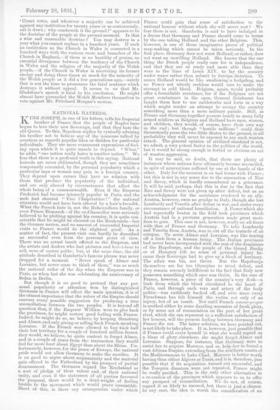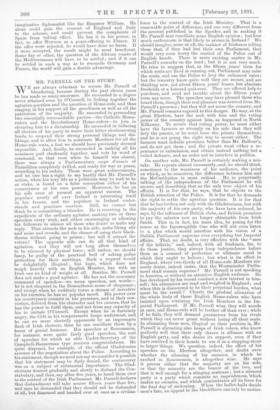NATIONAL HATREDS. K ING JOSEPH, in one of his letters, tells
his Imperial brother of France that the people of Naples have begun to love their new Sovereign, and that they hate the old Queen. To this, Napoleon replies by cynically advising his brother not to believe any of the nonsense talked by courtiers as regards popular likes or dislikes for particular individuals. They are mere evanescent expressions of feel- ing upon which it is quite unsafe to depend. "What," he adds, "one nation really hates is another nation." We fear that there is a profound truth in this saying. National hatreds are never obliterated, though they are sometimes temporarily concealed, by the personal popularity which a particular man or woman may gain in a foreign country. They depend upon causes that have no relation with those that produce the popularity of the individual, and are only altered by circumstances that affect the whole being of a commonwealth. Even if the Empress Frederick had become intensely popular in Paris, and the mob had shouted " Vive l'Imp6ratrice !" the national situation would not have been altered by a hair's-breadth. What the French hate is, not the Hohenzollern family, or even Prince Bismarck—if the ex-Chancellor were seriously believed to be plotting against his country, it is quite con- ceivable that he might be cheered on the Boulevards—but the German nation, and no amount of successful Imperial visits to France would do the slightest good: As a matter of fact, the present visit can hardly be described as successful even from the personal point of view. There was no actual insult offered to the Empress, and the artists and dealers who had pictures and bric-d-brac to sell, were of course polite ; but, at the same time, the old attitude described in Gambetta's famous phrase was never dropped for a, moment. "Never speak of Alsace and Lorraine, but never cease to think of them," was as much the national order of the day when the Empress was in Paris, as when last she was celebrating the anniversary of Sedan in Berlin.
But though it is no good to pretend that any per- sonal popularity or attention won by distinguished Germans in France will affect the main question, it is of the utmost importance that the rulers of the Empire should canvass. every possible suggestion for producing a true reconciliation between the two peoples. It is beyond all question that, if the Emperor William were to give back the provinces, he might restore good feeling with France. Indeed, he might do so, we believe, by keeping Strasburg and Alsace, and only giving or selling back French-speaking Lorraine. If the French were allowed to buy back half their lost territory for a couple of hundred million francs, they would, we believe, be quite content to forget Alsace, i and n a couple of years from the transaction they would feel far more hurt about Egypt than about the Rhine. Un- fortunately, however, for the peace of Europe, the national pride would not allow Germany to make the sacrifice. It is no good to argue about magnanimity and the material gam offered to the Fatherland by the prospect of partial disarmament. The Germans regard the Reichsland as a sort of pledge of their valour and of their national unity, and even if the statesmen of all parties favoured the proposal, there would be a dead-weight of feeling hostile to the movement which would prove irresistible. Short of this, is there any arrangement under which France could gain that sense of satisfaction to the national honour without which she will never rest ? We fear there is not. Gambetta is said to have indulged in a dream that Germany and France should come to terms- by the one taking Holland and the other Belgium. This, however, is one of those imaginative pieces of political map-making which cannot be taken seriously. In the first place, Germany does not want Holland, or rather, does not want an unwilling Holland. She knows that the one thing the Dutch people really care for is independence, and that they are as ready and more able than they were in the time of Louis XIV. to lay the country under water rather than submit to foreign dictation. To annex Holland would be like swallowing a hedgehog, and no Power not utterly reckless would care to make the attempt in cold blood. Belgium, again, would probably offer a formidable resistance, for if the Belgians are not great combatants in the open, General Brialmont has taught them how to use earthworks and forts in a way which might render an attempt to occupy the country something more than a mere military parade. Still, as France and Germany together possess nearly as many fully armed soldiers as Belgium and Holland have men, women, and, children, they would, of course, have their own way in the end ; but though "hostile millions" could thus. theoretically press the two little States to the ground, in all probability they will never be exposed to any such wanton attack. The general opinion of civilised mankind is not, we admit, a very potent factor in the politics of the world, but it would be strong enough to forbid so obvious an act of wanton aggression.
It may be said, no doubt, that there are plenty of instances where nations have ultimately become reconciled, in spite of annexations suffered by one at the hands of the other. Italy for the moment is on bad terms with Prance; but this is not in any sense due to the annexation of Nice and Savoy, which is hardly remembered as a grievance. It will be said, perhaps, that this is due to the fact that Nice and Savoy were not given up after defeat, but as an acknowledgment for the assistance rendered to an ally. Austria, however, owes no grudge to Italy, though she lost Lombardy and Venetia after defeat in war, and under every circumstance of national humiliation. A Power which she had repeatedly beaten in the field took provinces which Austria had in a previous generation made great sacri- fices to gain. This case is not, however, really on all-fours with that of France and Germany. To take Lombardy and Venetia from Austria, was to cut off the tentacle of an octopus. To sever Alsace and Lorraine, was like tearing off a limb from a human being. The Italian provinces had never been incorporated with the rest of the dominions of the Hapsburgs, and the people of the Grand Duchy or of Hungary felt no sense of personal injury be- cause their Sovereign had to give up a block of territory. The affair was his, not theirs. But the Hapsburgs themselves are far too Olympian to mind defeat, and they remain serenely indifferent to the fact that Italy now possesses something which once was theirs. In the case of France, however, a piece of the country's very flesh—a limb from which the blood circulated to the heart of Paris, and through each vein and artery of the body politic—was ruthlessly hacked off, and over since every Frenchman has felt himself the victim not only of an injury, but of an insult. Not until French antour-propre is soothed either by some dazzling accession of fresh glory, or by some act of renunciation on the part of her great rival, which she can represent as a, sufficient satisfaction of her honour, will the present feeling between Germany and France die out. The latter solution, we have pointed out, is not likely to take place. It is, however, just possible that if France could cover herself in what she would regard as a blaze of glory elsewhere, she might forget Alsace and Lorraine. Suppose, for instance, that Germany were to assist her to acquire Morocco, and so help her to found a vast African Empire, extending from the southern coasts of the Mediterranean to Lake Chad. Morocco 18 better worth having than either Algiers or. Tunis, and it is, therefore, just possible that if its acquisition turned out successful, and the Tonquin disasters were not repeated, France might be really pacified. This is the, only other alternative to a re-cession of the provinces which appears to us to offer any prospect of reconciliation. We do not, of course, regard it as likely to succeed, but there is just a chance. In any case, the idea is worth the consideration of an imaginative diplomatist like the Emperor William. He alone could gain the consent of England and Italy to the scheme, and could prevent the complaints of Spain from taking effect. He has it in his power, in fact, to offer Morocco as a peace-offering to France. If the offer were rejected, he would have done no harm. If it were accepted, the result might be most beneficent. Some day or other, the question of the African coasts of the Mediterranean will have to be settled; and if it can be settled in such a way as to reconcile Germany and France, the world will gain a double advantage.







































 Previous page
Previous page